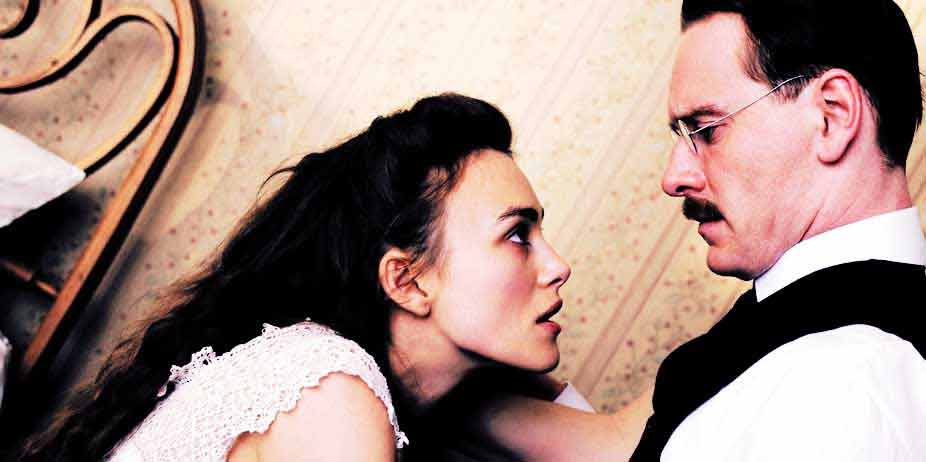
A Dangerous Method (2011)
Following the progression of thought in the minds of three psychologists in the Edwardian era, A Dangerous Method is an intriguing film about not entirely likable individuals that raises some interesting thoughts on morality and repression.
No one quite knows what to do with Sabina Spielrein (Keira Knightley). Her keen mind has been overcome with sporadic fits and hallucinations, which lands her in the mental hospital where Carl Jung (Michael Fassbender) is employed. She proves a fascinating subject, and one that prompts him to consult well-known psycho-analyst Sigmund Freud (Viggo Mortenson) for his opinion. Over the years, as Sabina improves under sexual therapy, Jung finds his idealistic views of morality challenged through another associate, who believes that monogamy is unnatural and nothing should ever be repressed. But his eventual relationship with Sabina will do more than threaten his reputation... it will also begin to dismantle his precarious relationship with Freud.
This is a fascinating movie on many levels, as it explores the hypocritical nature of humankind and at times impresses us with its psychological conclusions and at others makes us smile a bit in their far-reaching explanations. The obsession that Jung has with dreams reveals a lot about his inner motivations and fears, but quite early on we understand that while common interests bring them together, elements of pride will keep Jung and Freud apart. Jung is offended to be the mentored, and Freud cannot confide in them, leaving an unequal friendship certain to implode. In the midst of this sits Sabina, who when we first meet her is contorting her face inside a carriage and then much later, becomes a successful psychologist in the field.
Casting on this is utterly delightful. Keira in particular turns in an exquisite performance that requires a large amount of physical manipulation. It is both fascinating and painful for an audience to watch, as a woman struggles with expressing her internal emotions. Fassbender is an adequate Jung, and if his intention was to make me dislike the man, he did it perfectly. It's unusual to enter a movie about Jung and come out liking Freud more, but that is what happened. Viggo is brilliant in the role, vanishing into it so completely that at times I forgot he was acting. You can see the richness of the Edwardian period in the lush costumes and settings, some of which are particularly exquisite. It also has a beautiful musical score and real intelligence in its screenplay.
Fortunately, I did not have to sit through most of the harsher content, but the film does earn its R-rating for sexual material and nudity. There are two fairly graphic sex scenes, as well as scenes in which "therapy" includes beatings (that have a sexual reaction in the patient). At times, women's' breasts pop out of their corset, or in the process of being bathed, their nightgowns cling to their skin. Much dialogue revolves around sexual therapy, being aroused through violence, whether or not sexuality is the driving force of our lives, monogamy, adulterous affairs, and so forth. Jung carries on an affair with Sabina and then later, when pressured to stop due to public indignation, finds another mistress. There are a few scattered profanities but the only violence is wrestling with insane patients and an instance in which a woman cuts the face of a man with a letter opener.
If I had been forced to sit through the sexual content in this film, I would not have found it as fascinating as I did. Because that element could be brushed aside, I was left to enjoy the richness of the production and the intellectual scope of the script. I essence, what Jung is searching for is how to restore his patients to become productive. It is not enough to diagnose them, he wants to help them. But both he and Freud are completely devoid of God. Freud chooses to believe in nothing. Jung starts exploring spiritualism and mysticism. Each has a life that majors on minor things, from dreams to sexual tendencies, but overlook the greatest solution in their midst... the transforming love of a savior. And that is sad.
